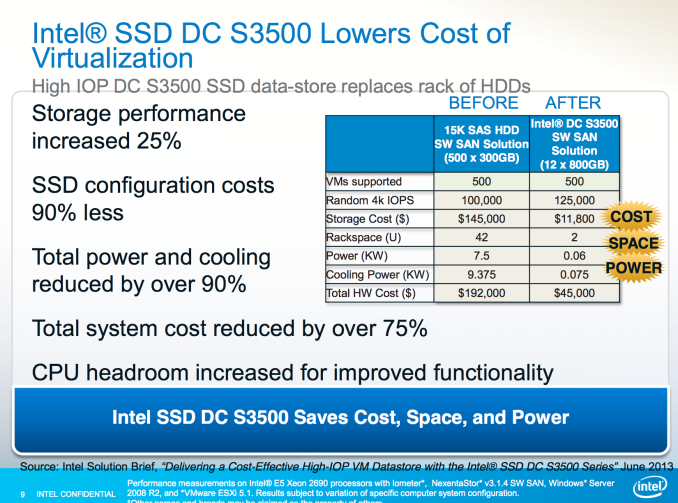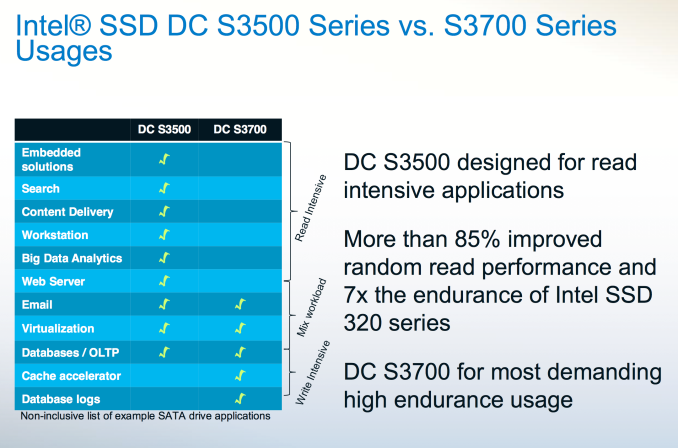Intel SSD DC S3500 Review (480GB): Part 1
by Anand Lal Shimpi on June 11, 2013 6:10 PM EST- Posted in
- Storage
- IT Computing
- SSDs
- Intel
- Datacenter
- Enterprise
Final Words
In our first high level look, Intel's SSD DC S3500 looks to be everything we loved about the S3700 but at a more affordable price point for enterprise customers who don't need insane amounts of write endurance. With SSDs in the enterprise there's this tendency to over estimate endurance needs. I was guilty of it in the design of our SSD requirements for serving AnandTech. Part of the problem is there aren't tons of good software applications to quietly monitor/report/analyze enterprise workload behavior. I suspect that for the vast majority of use cases however, the S3500 is likely more than enough. Even though the AnandTech database servers (content, stats tracking and forums) are fairly write intensive, the S3500 is actually the right target for us - the S3700 would deliver far more endurance than we'd ever use.
Other than write endurance, the only other thing you give up is random write performance. Intel's specs list the S3500 at roughly 1/3 of the sustained 4KB random write performance of the S3700, which I saw in our numbers as well. Given the lower price point however, most customers are likely comparing performance to an array of hard drives. On an individual level, a good high-end HDD will provide somewhere around 1 - 2MB/s in 4KB random write performance. The S3500 by comparison is good for about 40MB/s. Intel's own data shows that 12 S3500s will deliver roughly the same random IO as 500 15K RPM hard drives. Based on the data I've seen, that comparison is pretty accurate.
All of the other S3700 benefits remain. Performance consistency is excellent, which makes the S3500 ideal for use in many-drive RAID arrays. Intel's enterprise drives have typically done very well in terms of reliability as well (and I haven't heard any complaints about the S3700), making the S3500 a safe bet. My only real complaint about this drive is the idle power rating is too high for notebook use, because otherwise I'd even suggest looking at the S3500 for consumer use as well.
All in all I've been pleased with Intel's work in the enterprise SSD space. Most interesting to me is just how aggressive Intel has been in terms of enterprise SSD pricing. The S3500 shows up at well under $1.50/GB, and consumer drives aren't that far off in terms of pricing. Intel typically doesn't push this aggressively for lower prices with its enterprise products, so when it happens I'm very happy.












54 Comments
View All Comments
420baller - Tuesday, June 11, 2013 - link
First!kenour - Tuesday, June 11, 2013 - link
Fir... DAMN IT!DigitalFreak - Tuesday, June 11, 2013 - link
Retard!UltraTech79 - Tuesday, June 11, 2013 - link
What are you, fucking 12? Get the fuck out of here.Makaveli - Tuesday, June 11, 2013 - link
I agree with UltraTech.420 No real girl baller its past your bed time GTFO.
Spunjji - Wednesday, June 12, 2013 - link
Fail!BMNify - Tuesday, June 11, 2013 - link
F... bummer!texasti89 - Tuesday, June 11, 2013 - link
Great work Anand, indeed these last two weeks have been really hectic for tech sites. Great new techs have been announced. I'm happy for all the technological evolution that has taken place in the last 4 years, especially on the flash storage side. I'm only hoping that the price/GB for these new enterprise SSDs will come soon below 1$/GB.ImSpartacus - Tuesday, June 11, 2013 - link
Yes, I'm impressed. Even this brief look at the new Intel drive is very helpful. I'll definitely be back for the rest of it.petertoth - Tuesday, June 11, 2013 - link
The write endurance seems to be pretty low though! 450000GB/800GB = 562 cycles. Others do something like 2-3000!